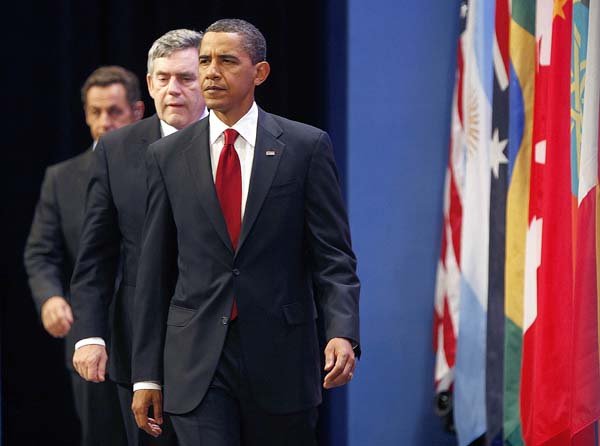LITTLE ROCK — World leaders lined up Friday behind sweeping promises to fix a malfunctioning global economic system in hopes of heading off future financial meltdowns.
For now, they said, they would keep stimulus programs going "until recovery is assured."
"We will need to work together as we manage the transition to a more balanced pattern of global growth," the leaders of 20 wealthy and developing nations said in a draft statement as they wrapped up two days of talks.
In the first international summit hosted by President Barack Obama, the G-20 moved to give China and other fast-growing economies a bigger say in decisionmaking, announcing that the Group of 20 nations is replacing the G-8 as the main forum for global economic coordination.
The decision came as Obama, Chinese President Hu Jintao and other leaders gathered in Pittsburgh for their third summit in a year to reshape the governance of the world economy after the worst financial crisis since the Great Depression.
The G-8 will still exist and focus on matters such as development and security matters, Canada's Prime Minister Stephen Harper said Friday. Canada hosts the G-8 next year.
The transfer of influence to the broader group, whose membership ranges from the U.S. to China to Saudi Arabia, reflects the fact that the richest industrial nations now lack the sway to govern the world economy alone after their excesses sparked the turmoil that tipped the globe into recession.
"The G-20 needs to prove it can make the tough calls and implement agreed outcomes in a timely fashion," said Tim Adams, who served as the U.S.Treasury's top international official under former Secretaries John Snow and Henry M. Paulson, and is now managing director of the Lindsey Group. "I think it will succeed, but the G-20 must prove skeptics wrong, and that will take time and effort."
The G-20 accounts for about 85 percent of global gross domestic product and was created after a spate of currency devaluations plagued emerging markets from Russia to Thailand in the 1990s. The G-8 oversees about two-thirds of global gross domestic product.
BACK FROM THE BRINK
In wrapping up the summit, the leaders declared progress in their coordinated efforts to prevent a global financial collapse.
"It worked," they said in a statement released as the summit closed.
"Our forceful response helped stop the dangerous, sharp decline in global activity and stabilize financial markets," the statement said. It said industrial output is rising, and trade is recovering. In addition, financial institutions are raising capital, and confidence is rising.
But they cautioned: "A sense of normalcy should not lead to complacency."
"We will need to work together as we manage the transition to a more balanced pattern of global growth," the statement said.
Obama said action by theGroup of 20 nations since April "brought the global economy back from the brink."
"Financial markets have come back to life, and we stopped the crisis from spreading further to the developing world," Obama said.
The leaders moved to require members to subject their economic policies to the scrutiny of a peer review process that would determine whether they were "collectively consistent" with sustainable global growth. They promised tighter and more coordinated financial regulation.
And, repeating pledges from G-20 summits in November and April, when financial panic was rampant, they vowed anew to "reject protectionism in all its forms." They also went along with Obama's push for a pledge to withdraw government subsidies for fossil fuels such as oil, coal and natural gas believed to contribute to global warming.
While issuing the lofty vows, the leaders failed to define how to accomplish many of them.
They did not suggest, for instance, how the peer review process would be enforced. And they failed to mention that previous pledges to avoid protectionism had been ignored by nearly all 20 members.
Disagreements over whether China should gain voting strength in the International Monetary Fund at the expense of European nations and over global warming language marred the summit.
Still, participants claimed success.
"The old system of international economic cooperation is over. The new system, as of today, has begun," declaredBritish Prime Minister Gordon Brown, referring to the enhanced status for the Group of 20.
"I have the impression that we are on a successful path," said German Chancellor Angela Merkel, who was leaving Pittsburgh to fly back to Berlin where she was to hold her final campaign rally today before facing German voters Sunday.
The G-20 includes; Argentina, Australia, Brazil, Canada, China, France, Germany, India, Indonesia, Italy, Japan, Mexico, Russia, Saudi Arabia, South Africa, Korea, Turkey, the United Kingdom, United States and European Union.
SUMMIT PROTESTERS
Thousands of demonstrators pledging nonviolence banged drums, danced and held signs advocating everything from human rights to ending war during a march through Pittsburgh.
Police lined the route in front of the marchers.
The demonstrators in the so-called People's March were demanding solutions to environmental and economic crises that they believe were created by the G-20, said Pete Shell, a protest organizer. Leaders of those countries and the European Union were meeting downtown, a few blocks from where the march was expected to pass.
The demonstration was sponsored by The Thomas Merton Center, a Pittsburgh peace organization, and was bolstered by smaller "feeder marches." The group planned a midmarch rally near a local government building and then another one in the late afternoon.
The march organizers had a city permit and pledged to keep it nonviolent.
On Thursday afternoon, a march without a permit ended with clashes between police and protesters.
Information for this article was contributed by Hans Nichols and Simon Kennedy of Bloomberg News; and Martin Crutsinger, Tom Raum, Emma Vandore, Mark Scolforo and Ramit Plushnick-Masti of The Associated Press.
Front Section, Pages 1, 5 on 09/26/2009

